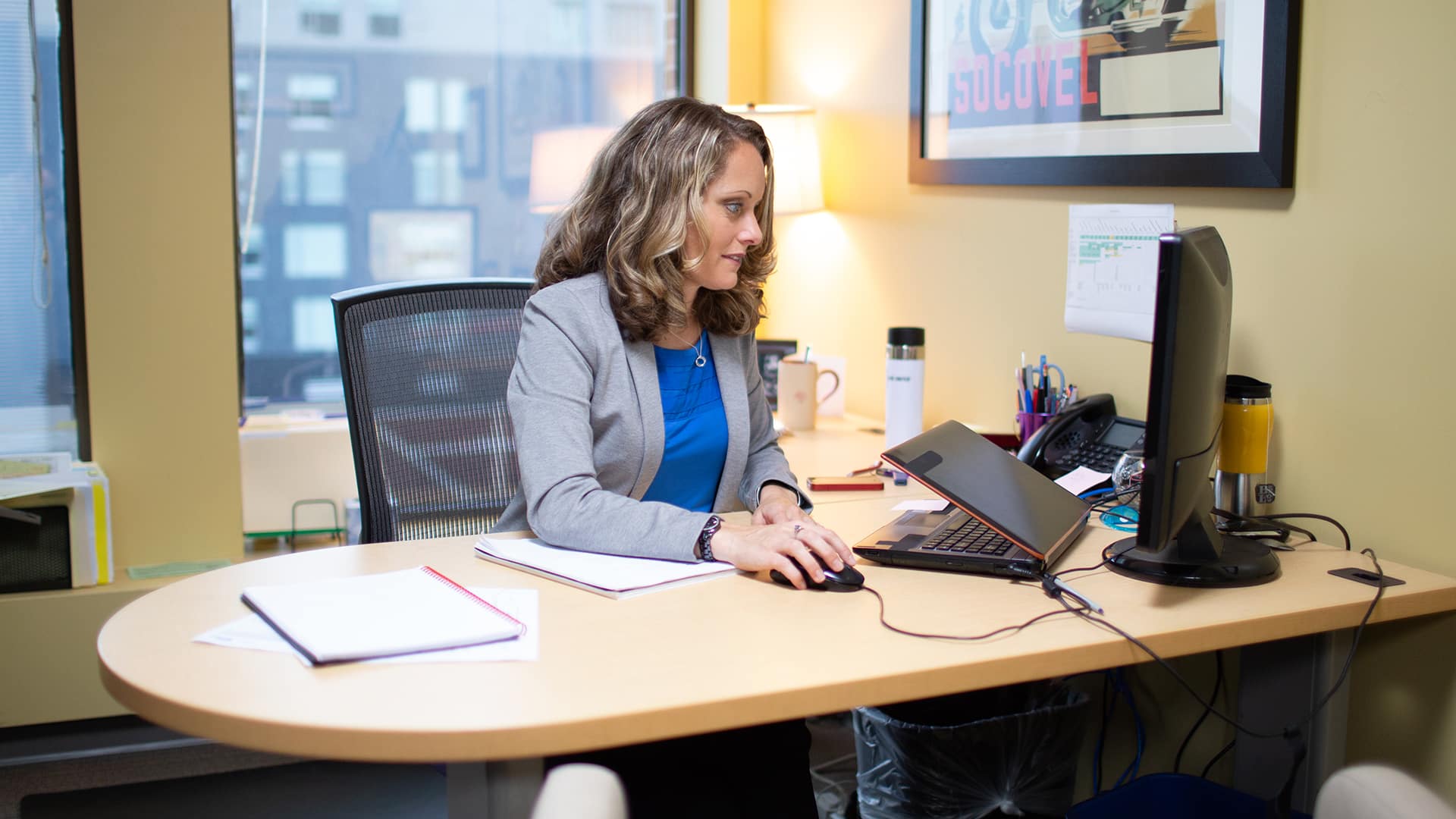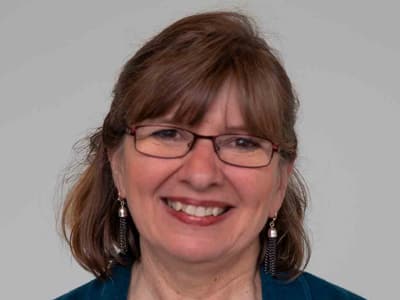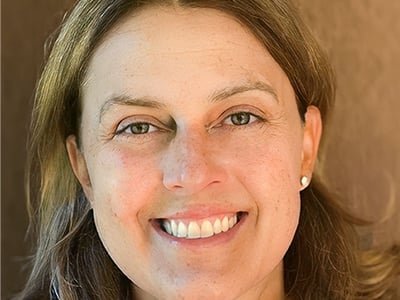For Jazzmen Shipp, Earning a Degree Changed Everything
Business | 2min Read

Learn to identify the red flags that indicate various types of fraud, fraud schemes and scams in the online Graduate Forensic Accounting and Fraud Examination Certificate program at Southern New Hampshire University.
Aligned with the Certified Fraud Examiner (CFE) Exam, this certificate can help you develop professional skepticism skills and gain an eye for detail with a background in accounting basics and legal concepts.

The online graduate certificate in forensic accounting and fraud examination is designed to provide in-depth knowledge of auditing, forensic accounting and the detection and prevention of fraud. Through 4 highly focused courses, you'll gain skills and experience in risk management, ethical conduct, legal knowledge and communications.
In the forensic accounting certificate program at Southern New Hampshire University, you'll complete projects that demonstrate your understanding of legal and regulatory issues, how to conduct fraud examinations and interviews and the application of technology and analytics in fraud examinations. These are knowledge and skills that could help you prepare for the Certified Fraud Examiner (CFE) Exam.
Defining an area of specialization is another way to stand out in the accounting industry. If you're also pursuing your MS in Accounting degree at SNHU and want to pursue a fraud examination career, this could be a great certificate to add to your studies. The programs share 6 credits, allowing you to earn both a degree and certificate for only 36 credits — excluding foundations, if needed.
Note: If you don't have an undergraduate accounting or business degree, you may be required to complete business foundation courses (6 credits) and/or accounting foundation courses (12 credits) in addition to your core courses.
Visit the course catalog to view the full Graduate Certificate in Forensic Accounting & Fraud Examination curriculum.
Minimum Specifications:
Additional Information:
SNHU has provided additional information for programs that educationally prepare students for professional licensure or certification. Learn more about what that means for your program on our licensure and certification disclosure page.
Our no-commitment application can help you decide if SNHU is the right college for you and your career goals. Apply up until 2 days before the term starts!
Upcoming term starts: July 6, 2026 | September 21, 2026
Attending college online at SNHU can be a life-changing experience. In fact, 93.4% of online students would recommend SNHU according to a 2025 survey with 8,718 respondents.
At Southern New Hampshire University, you'll gain knowledge from passionate faculty. Each of our forensic accounting classes is taught by experienced instructors and specifically designed to engage research-focused minds.

Mona Stephens teaches financial and managerial accounting at SNHU. She has over 25 years of accounting experience and has been teaching accounting for almost 20 years. She is a Certified Public Accountant, Certified Internal Auditor and a member of the Government Finance Officers Association, the American Association of Accountants and the Institute of Management Accountants.
Position
Accounting Faculty Lead
Joined SNHU
2011
Education

Dr. Emmanual Appiah has been a senior technical support auditor for a governmental agency in the Washington, D.C. area for more than two decades. He is a Certified Public Accountant, a Certified Fraud Examiner and a Chartered Global Management Accountant. In addition, he serves on the editorial advisory boards of the AICPA "Journal of Accountancy" and ACFE's "Fraud Magazine. He's also a member of the District of Columbia Society of CPAs.
Position
Adjunct Faculty
Joined SNHU
2023
Education
"SNHU provides hands-on, real-time, high-quality, applicative and technical training for students beneficial for a lifetime professional, technical and experiential learning."
– Dr. Emmanuel A. Appiah

Kristin Regis began her teaching career as an English instructor at Edogawa University near Tokyo, Japan. Her passion for teaching and finance prompted her to start teaching finance courses part time at SNHU (both face-to-face and online) before transitioning into a full-time finance faculty lead role. Prior to working full time for SNHU, she held corporate and municipal leadership positions for over 10 years. Regis is a member of the Financial Planning Association
Position
Senior Associate Dean
Education
You’ll take your courses within SNHU’s Brightspace platform. This is where you’ll find your:

At Southern New Hampshire University, you'll have access to a powerful network of more than 400,000 students, alumni and staff that can help support you long after graduation. Our instructors offer relevant, real-world expertise to help you understand and navigate the field. Plus, with our growing, nationwide alumni network, you'll have the potential to tap into a number of internship and career opportunities.
Recently, SNHU has been nationally recognized for leading the way toward more innovative, affordable and achievable education:
Founded in 1932, Southern New Hampshire University is a private, nonprofit institution with over 250,000 graduates across the country. SNHU is accredited by the regional accreditor New England Commission of Higher Education (NECHE), which advocates for institutional improvement and public assurance of quality.
No application fee. No test scores. And no college essay. Just a simple form with basic information. It’s another way SNHU helps you reach your goals sooner.
It's easy, fast and free.
Whether you're applying for an undergraduate or graduate degree, you’ll fill out a form to verify your previous education experience. As part of our admissions process, we'll help you request transcripts from your previous school(s) to see if you can transfer any credits into your SNHU program! (Also for free!)
After reviewing your official evaluation, you can decide if SNHU is right for you! If you choose to enroll, just pick your start date and get ready for classes to begin.
Talk to an admission counselor: 888.327.SNHU | enroll@snhu.edu
SNHU is accredited by the regional accreditor the New England Commission of Higher Education (NECHE). The university also carries specialized accreditations for some programs.

As a nonprofit university, SNHU offers some of the lowest online tuition rates in the country. And when you work with our Financial Services team, we'll explore ways to help you save even more on your education – and customize a payment plan that works for you.
This certificate program is eligible for Federal Student Aid.
Tuition rates are subject to change and are reviewed annually.
*Note: Students receiving this rate are not eligible for additional discounts.
Additional costs: Course materials vary by course.
The demand for professionals with accounting certificates and accounting degrees is rising, creating a strong job market for those with an accounting background.
And with a forensic accounting graduate certificate, you could put your investigation skills to use as a forensic accountant, fraud investigator or financial examiner – roles that have become increasingly crucial to business. According to a 2022 survey from PwC Global, 46% of surveyed organizations experienced fraud or other economic crime in 2020 and 2021, totaling billions of dollars in financial loss.1
With a career in fraud examination, you could find yourself practicing forensic accounting in a number of industries:
Help businesses — including financial institutions, as well as public and private enterprises — conduct, facilitate or oversee investigative accounting work.
Work as an in-house forensic accountant, monitoring fiscal activity, setting guidelines for financial compliance and conducting risk assessments.
Assist a variety of clients who are in need of investigative support and/or risk mitigation services.
Help support efforts to control government spending by ensuring public funds are being used.
Conduct claims analysis and processing for insurance claims to ensure adequate services are rendered and align with billing and adjustments.
Participate in criminal investigations involving financial crimes by auditing accounting records in search of misappropriation of funds evidence.
Increase nationally in financial examiner positions through 2032, projected by the U.S. Bureau of Labor Statistics (BLS).2
Median annual salary nationally for financial examiners as of May 2023, according to the BLS.2 Statistic not based on wage data for SNHU graduates.
Understanding the numbers
When reviewing job growth and salary information, it’s important to remember that actual numbers can vary due to many different factors—like years of experience in the role, industry of employment, geographic location, worker skill and economic conditions. Cited projections are based on Bureau of Labor Statistics data, not on SNHU graduate outcomes, and do not guarantee actual salary or job growth.
Forensic accounting is a specialized form of accounting that typically revolves around financial disputes or fraud. These accountants investigate and audit accounts and records to help others either come to an agreement or be brought to trial.
A few areas in which forensic accountants can help people or organizations include:
Earning a Forensic Accounting and Fraud Examination Certificate as a complement to your bachelor's degree in accounting or an addition to your master's in accounting or master's in finance can give you an enviable skill set.
Forensic accountants may be asked to:
You'll also need to be on the watch for both internal and external perpetrators. In a 2022 survey, 43% of external predators, 31% of internal predators and 26% of colluding internal and external predators were the cause of the most disruptive or serious incidents of fraud.1
You can become a Certified Forensic Accountant (CRFAC) through the American Board of Forensic Accounting (ABFA).
So, how can you earn this certification4?
While you must be a Certified Public Accountant (CPA) or international equivalent in order to be eligible to apply for a CRFAC credential, SNHU's Graduate Certificate in Forensic Accounting & Fraud Examination supports students in their pathway towards a Certified Fraud Examiner (CFE) credential.
The best forensic accounting certification is the one that gives you both the skills you need and the recognition from employers.
Many would argue that the Certified Fraud Examiner (CFE) credential is the one that organizations look for in a forensic accountant. Administered by the Association of Certified Fraud Examiners (ACFE), it's considered the world's largest anti-fraud organization.
The ACFE notes that CFEs are different because they have a "unique set of skills that are not found in any other career field or discipline; they combine knowledge of complex financial transactions with an understanding of methods, law and how to resolve allegations of fraud."3
The organization reports that to become a CFE, you must meet high educational, professional and ethical standards – and that's because the certification is considered one of the most marketable credentials in the industry today.3
According to the U.S. Bureau of Labor Statistics, the median annual salary for accountants and auditors was $79,880 in 2023 – above the wages for all workers.2 But forensic accountants may be able to earn quite a bit more.
According to the Association of Certified Fraud Examiners (ACFE), the median annual salary for CFE members in 2022 was $106,000.3
Based on educational experience and professional credentials or certifications, CFEs may have additional earnings potential. For instance, a CFE who also holds a master's degree in accounting and a CPA designation is likely to have a higher salary than a CFE who doesn't.
According to the Association of Certified Fraud Examiners (ACFE), you must satisfy the following five requirements to earn your Certified Fraud Examiner (CFE) credential3:
Southern New Hampshire University's (SNHU) Forensic Accounting and Fraud Examination Graduate Certificate is aligned with the CFE Exam to help you gain the skills required to successfully pass the exam. Earning the certificate in addition to a CFE designation may help you gain a competitive advantage in the job market, as would coupling the certificate with an MS in Accounting degree.
A Certified Fraud Examiner (CFE) credential is quite advanced. However, the level of difficulty a candidate experiences while acquiring it is largely dependent on their existing experience and skill set. Additionally, not all high-level jobs in the field require you to be a CFE, but it's a great way to substantially increase your marketability.
SNHU's online Forensic Accounting and Fraud Examination Graduate Certificate helps you gain the following skills, all of which are essential to becoming a fraud examiner:
Upon completion of the certificate, you should be able to apply and develop fraud investigation, detection, documentation and prevention techniques in order to mitigate accounting and financial fraud in organizations and adhere to the ethical responsibilities of fraud investigators.
Both Certified Public Accounting (CPA) and Certified Fraud Examiner (CFE) designations are impressive. One isn’t necessarily better than the other — they’re just different.
So what differentiates the two?
A CPA is considered an expert in all things accounting, though they may choose to pursue a specialization. To account for this, the newly revised CPA Exam requires candidates to choose one of 3 discipline areas in which to demonstrate greater knowledge — Business Analysis and Reporting for Accounting, Information Systems and Controls, and Tax Compliance and Planning.
On the other hand, a CFE's training is focused on detecting, investigating and preventing fraud.
CPAs and CFEs can take on some of the same tasks, however, including tax preparation, financial planning and internal auditing.
1 PwC, Protecting the perimeter: The rise of external fraud — PwC's Global Economic Crime and Fraud Survey, 2022, on the internet, at https://www.pwc.com/gx/en/services/forensics/economic-crime-survey.html (viewed May 29, 2024)
2 Bureau of Labor Statistics, U.S. Department of Labor, Occupational Outlook Handbook, on the internet, at:
Cited projections may not reflect local or short-term economic or job conditions and do not guarantee actual job growth.
3 Association of Certified Fraud Examiners, on the internet, at:
4 American Board of Forensic Accounting, Steps to Certification, on the internet, at http://abfa.us/steps/ (viewed May 29, 2024)